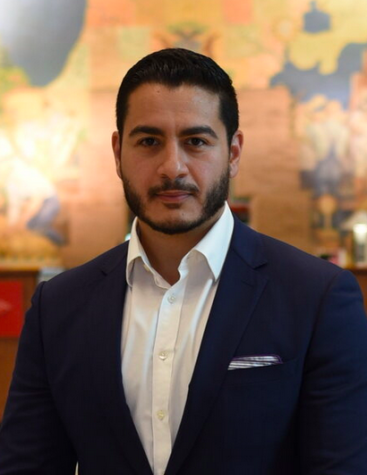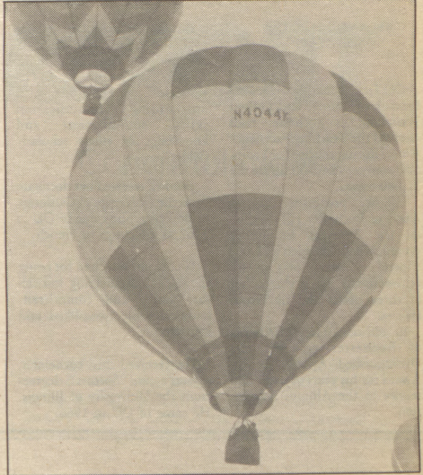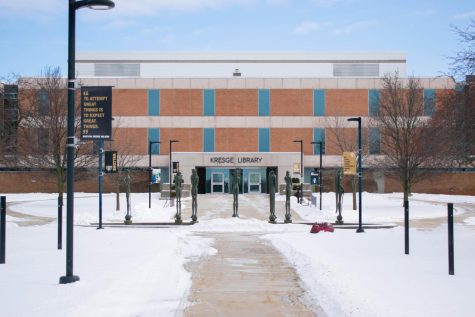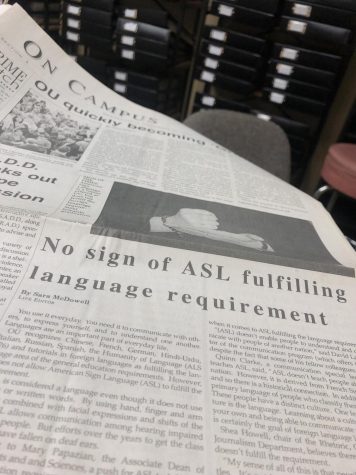Looking Back: The first graduating class
In April 1963, the first graduates of Oakland University received their diplomas. 148 students were part of this charter class.
Not only was this class remarkable in their ability to make it through Oakland’s rigorous grading system, but many of them had job offers and fellowships for graduate study.
Students who graduated were offered jobs ranging from $7000 to $7200 a year. The national average salary for a college graduate was $6874, putting OU graduates a bit ahead when it came to prospective job offers.
43 OU students, as of the time of the April 12, 1963 article, decided to go on to graduate school. 13 of those received fellowships and teaching assistantships ranging in value from $1350 to $6000 per year.
Some of these fellowships were national academic awards, four of them were awards that saw thousands of college senior applicants. OU students received three National Defense Education Act Fellowships, one received a National Science Foundation Fellowship and one received a Woodrow Wilson Fellowship.
One Russian major student, Robert Richardson, received both a Wilson and an NDEA Fellowship. He accepted the NDEA fellowship, since it paid $20,000 for four years of graduate study at Harvard University,
Richardson went on to get his MA and Ph.D from Harvard University, and currently is working at Boston University as a professor of World Languages and Literature.
Dr. Robert Hoopes, professor of English and a regional representative of the Woodrow Wilson Foundation Fellowship program, spoke about the abnormally high number of awards this first graduating class received.
“This is an outstanding record,” he said. “It would be unusual in an established institution for one-eighth of the seniors to win awards for graduate study, especially when the list includes a coveted Woodrow Wilson Fellowship, three NDEA Fellowships and an NSF Fellowship, plus nearly a dozen awarded by institutions.”
What made this achievement even more outstanding was that, as the charter class, the graduates could not rely on their university’s notoriety to help them. They were paving the way for future students’ success.
“Every such award, whether offered by a university or a national agency, is truly a national competition,” Hoopes said. “This performance is even more noteworthy because it has been achieved by a young institution’s first graduates, many of whom had no thought of scholarly work for advanced degrees when they entered Oakland four years ago.”
There was so few graduates that each student graduating had their name featured in the program guide for the first commencement.
In this first class, only two students graduated Summa Cum Laude. These were Judith Bair Bank in English and Marcia Koerner Weis in French. There were also three honorary degrees given out: A Doctor of Humanities to Matilda R. Wilson, a Doctor of Laws to Harold A. Fitzgerald, and a Doctor of laws to Francis Keppel.
Though the name Matilda Wilson should be familiar, Harold Fitzgerald and Francis Keppel may be a bit more unrecognizable. Harold Fitzgerald and his wife donated $45,000 to the building of Fitzgerald Hall, and Fitzgerald himself served as a publisher at the Pontiac Press and acted as the president to the MSUO Foundation. Francis Keppel was the US Commissioner of Education, and spoke at commencement.
According to Oakland’s website, honorary degrees are given as a way of saying thank you to those who made “contributions to society.” For an honorary degree to be given, the University Senate Honorary Degrees Committee reviews nomination, then recommends candidates to the provost and then to the president.
Some other people who have received honorary degrees from Oakland University include Ann V. Nicholson, R. Hugh Elliott, Donald D. O’Dowd, Benjamin H. Anibal and John Alfred Hannah.








Paul Turk • Jun 28, 2018 at 4:46 PM
Cheryl…
Just a modest correction to your piece about Wolf Metzger and the Oakland Observer… I was on the OO staff starting in September ’60; then editor-in-chief from Fall, 1962, until graduation in April ’64. Wolf was managing editor that year (and our Star Columnist was Daniel Polsby, until recently, dean of Virginia’s George Mason University Antonin Scalia School of Law. He saw his role as that of a latter-day H.L. Mencken. He and Wolf were NOT drinking buddies.)
The sex survey piece (and subsequent consequences) happened on Wolf’s watch in the fall of ’64, after I left. He was a particularly outspoken and stubborn fellow, not too skilled at choosing from among battles to fight.
Paul A. Turk ’64 (student #1271)
Herndon Virginia